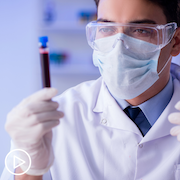What Should You Know About CLL Genetic Testing?
What Should You Know About CLL Genetic Testing? from Patient Empowerment Network on Vimeo.
In chronic lymphocytic leukemia (CLL) diagnosis and disease management, genetic testing plays a key role. Dr. Jennifer Woyach explains what is examined in CLL genetic testing, the timing and administration of testing, and testing advances.
Dr. Jennifer Woyach is a hematologist-oncologist specializing in chronic lymphocytic leukemia (CLL) at Ohio State’s Comprehensive Cancer Center – James Cancer Hospital & Solove Research Institute. Find out more about this expert here.
Related Resources

|

|

|
Transcript:
Katherine:
Before we get deeper into our conversation about genetics, there are a few terms that patients are often confused by. As a primer, I thought we could start by defining some of these terms. First, what is genetic or molecular testing?
Dr. Woyach:
So, all cancer cells will have a collection of mutations or abnormalities in the DNA that either make the cell a cancer cell or make it behave in a certain way. And so, these mutations are referred to as the genetic abnormalities of the CLL cells. So, when we talk about genetic testing in CLL, we use it to mean a number of things. We can use it to look specifically for types of mutations so types of genetic abnormalities.
We also sometimes use that as a kind of catch-all term like genetic or molecular testing also to refer to looking at changes in the chromosomes inside of a CLL cell. That’s also called cytogenetic testing. And then, we also use a number of tests in CLL where we look at specific, not necessarily abnormalities, but just changes in the cell that can indicate a certain type of behavior.
Katherine:
How is this different from genomic testing?
Dr. Woyach:
So, genetic and genomic testing, I think, are usually used interchangeably. But sometimes, we use them in different contexts but they really mean the same thing in this case.
Katherine:
Okay. And what is a chromosome change?
Dr. Woyach:
So, as you might remember from biology class maybe a long time ago, as it was for me, inside a cell, so a normal cell or a cancer cell, you have the nucleus, which holds the DNA.
And the DNA is organized into chromosomes. And so, when a cell goes through division, it takes those chromosomes, copies them and then, breaks them apart into two different cells. So, changes can happen in the level of the DNA itself. So, a mutation where one base is changed to something different. So, that would be just like a single nucleotide change. And that’s something you’re not going to see as a change to a chromosome. Another thing that can happen in CLL and in other cancers, too, is that during that process of cell division, an entire chromosome could be duplicated. It could be absent.
More commonly, parts of chromosomes can change. This is all because cancer cells just do a very poor job of editing their division.
An in normal cells, there are multiple steps along the way from the process of copying the genes to copying the chromosomes to doing the division. And every step along the way, if something happens incorrectly, which happens a lot, the cell usually just dies. But a cancer cell is not going to do that because it has so many signals that keep telling it to stay alive that it can tolerate a lot of different abnormalities. And so, you end up with cells that are just very different from what you would see normally.
Katherine:
All right. Well, that’s a great way for us to start. Let’s go into the discussion of the relationship between testing and CLL. How is testing administered?
Dr. Woyach:
So, almost all testing, in terms of molecular genomic testing in CLL, can be done on a blood sample. So, that’s one important thing.
The CLL guidelines recommend that testing for certain prognostic factors be done before the administration of therapy. So, at the very least, before somebody starts treatment, they should have these tests performed. In my practice and I think most CLL specialists find it really helpful to do these tests, not necessarily just at the time of treatment but really at the time of diagnosis or the time we first see the patient because CLL is a very heterogenous disease, which means that it behaves very differently in different people. So, there are some people that are diagnosed and will go 10 or 20 years before they need any treatment.
And many don’t need treatment at all. Whereas other people are very likely to need treatment within the first few years after diagnosis. Some of the genetic tests that we do can help counsel patients on where they’re likely to fall in that spectrum.
And so, I think that’s helpful for people to know early on in the disease course. But really, the tests can be performed at any time before treatment
Katherine:
Have there been advances in testing?
Dr. Woyach:
Absolutely. I think in every cancer, we’ve learned so much more about the biology of the disease, specific mutations that cause specific behaviors of cells, and really much more in CLL about the common genetic changes and what those means to response to therapy.










